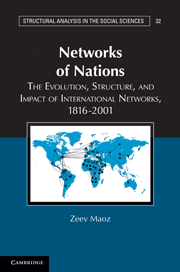Book contents
- Frontmatter
- Contents
- Preface
- Part I What Are International Networks?
- 1 Social Network Analysis and the Study of World Politics
- 2 Fundamental Issues in Social Network Analysis: Concepts, Measures, Methods
- 3 The Network Structure of the International System, 1816–2001
- 4 Security Egonets: Strategic Reference Groups and the Microfoundations of National Security Policy
- Part II The Formation of International Networks: Theory and Evidence
- Part III The Implications of the Networked International Politics Theory
- Glossary
- Bibliography
- Author Index
- Subject Index
1 - Social Network Analysis and the Study of World Politics
Published online by Cambridge University Press: 05 June 2012
- Frontmatter
- Contents
- Preface
- Part I What Are International Networks?
- 1 Social Network Analysis and the Study of World Politics
- 2 Fundamental Issues in Social Network Analysis: Concepts, Measures, Methods
- 3 The Network Structure of the International System, 1816–2001
- 4 Security Egonets: Strategic Reference Groups and the Microfoundations of National Security Policy
- Part II The Formation of International Networks: Theory and Evidence
- Part III The Implications of the Networked International Politics Theory
- Glossary
- Bibliography
- Author Index
- Subject Index
Summary
Introduction
On October 29, 1929, “Black Tuesday,” stock markets in the United States collapsed. This event generated global ripple effects. Within weeks, worldwide production levels dropped sharply. Exports in most industrialized states plummeted by as much as 50 percent. Construction ground to a halt. Unemployment rates rose to 25 percent in the United States and to as much as 40 percent in several European states. The Western and Central European states were hit the hardest, as their economies were highly dependent on trade with the United States and with each other. England was America’s largest trading partner. It was also the largest trading partner of France, Netherlands, and Sweden. Netherlands also had substantial trade with Germany, which also happened to be the largest trading partner of Turkey, Czechoslovakia, and Poland. Economists continue to hotly debate the reasons for the Great Depression (Hall and Ferguson, 1998). However, it is clear that this event had such profound ripple effects because of a growing level of global economic interdependence, the monetary and fiscal policies of the key states in the system, and the global expansion of money supply and credit. The Great Depression also brought about political changes in several states. The rise to power of Hitler and the Nazi Party in Germany, the 1931 Japanese invasion of Manchuria, and Japan’s 1936 invasion of China can be directly or indirectly linked to the Great Depression.
On August 1, 1990, Iraqi troops invaded Kuwait. Within a few weeks, a coalition of thirty-four nations – some committing troops, others contributing funds and logistics – organized to push Iraq out of Kuwait. This coalition was led by the United States, but it also included Iraq’s Arab allies: Egypt, Syria, Saudi Arabia, and the Persian Gulf States. The United Nations Security Council authorized economic sanctions against Iraq on August 6 and later (November 29, 1990) voted to authorize the use of force if Iraq did not withdraw from Kuwait. On the night of January 15, 1991, the coalition attacked Iraq, starting the first Gulf War.
- Type
- Chapter
- Information
- Networks of NationsThe Evolution, Structure, and Impact of International Networks, 1816–2001, pp. 3 - 32Publisher: Cambridge University PressPrint publication year: 2010



